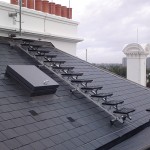Guardrail Systems Installation: Temporary, Permanent or Modular?
 Guardrail systems installation can be temporary or permanent, modular or custom fabricated, and penetrating or non-penetrating. Selecting the right type of guardrails for your particular application is an important factor in the planning process of your fall protection system.
Guardrail systems installation can be temporary or permanent, modular or custom fabricated, and penetrating or non-penetrating. Selecting the right type of guardrails for your particular application is an important factor in the planning process of your fall protection system.
Temporary vs. Permanent
Temporary safety railings are often used during construction activities, such as during a roof replacement. We offer them as rentals, but they also can be or purchased and remain in place only for as long as the work is actively being conducted on the elevated surface. Many preventable worker deaths are reported to OSHA each year from roofers or maintenance personnel accidentally backing into an unprotected skylight while focused on the task in front of them. On larger roofs, portable guardrail that can be moved from one location to another as the work progresses is an inexpensive way to save lives.
Permanent systems are designed to remain in place for a period of years or for the life of the building. They are used in areas such as where rooftop HVAC or communications equipment is located near a roof edge, requiring maintenance and other personnel to access the area on a periodic basis. It would be impractical to re-install portable railings every time maintenance access is required, so a permanent system would be left in place.
Modular vs. Custom
Manufacturers such as Bluewater Manufacturing and Kee Safety produce full lines of guardrail systems. These versatile and configurable railings can be adapted to fit almost any application, and are available in a variety of finishes, colors and styles. Economies of scale achieved through the standardization of components lead to these products generally being less expensive than a custom solution that goes through a site-specific design and engineering process and is locally manufactured.
The available components for ladder transition, rooftop walkways, roof hatch systems and skylight protection, parapet walls, etc., can be “mix and matched” to achieve a complete, passive fall protection system requiring no specialized worker training or equipment. In addition to the cost of material, additional savings are achieved in installation, as modular railings are significantly faster to install. We provide design and engineering services to combine components into a comprehensive passive fall protection system.
Specific, pre-designed and engineered solutions are available for a variety of applications, including for machine guarding, crowd control and HVAC equipment. Non-metallic construction is available for use in situations where steel would interfere with telecommunications or other equipment.
Penetrating vs. Non-Penetrating
Modular guardrail systems are generally installed with weighted bases that require no penetration of the roof. For existing buildings requiring the addition of rooftop fall protection, this is an important consideration for several reasons. First, penetration of an EPDM membrane can void the manufacturer’s warranty against leaks. Second, any time a hole is made in the roof, there is a risk of leaking, regardless of what method is used for resealing. Lastly, a base can be placed in minutes, compared to hours to break through the surface, attach a post, and reseal.
For some applications modular bases are not practical. For example, a railing at a high traffic area such as a ground level walkway would require the posts to be directly mounted into the concrete or other walking surface, as the size and profile of the bases would result in a tripping hazard. For the same reason, railings for stairways would always be mounted directly into a wall or walking surface. Modular manufacturers’ product lines include railing systems that can be permanently mounted directly into concrete and installed without any on-site welding required.
If you have a question about this topic, give us a call. One of our experts will be glad to help.
or
dial us at 1-(855) 279-2000

